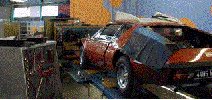The automotive mechanic profession
|
Languages of the mechanic
|
The automotive culture

|
The professional teaching
|
The teaching in English

|
Appendix 1 - The Basic Technical Gestures
To check by eye
To check by hand
To define a process of verifications
To specify the chronology of each sequences
To make the verifications
To establish the anomaly listing
To associate each anomaly with a deficient component
To establish the list :
- of parts or systems to change,
- of parts or systems to repair,
- of adjustments to do
To mark
To mark the relative positions
To mark the chronology of operations
To respect the matching of systems or sub-systems
To adjust
To identify the points of adjustment and the values of reference
To decide the action of adjusting
To respect the prescribed method of adjsuting
To choose the tools rationally
To check the stability of the adjusting
To find an information
To make the listing of the necessary informations to intervention
To ask for the missing informations
To find the necessary information
To decode and to appropriate information
To use a computer and its softwares
To use the in line services (Internet) : directories, websites
To screw / to unscrew
To stop a screw / to unscrew
To approach
To tighten to the value of reference (torque)
To drain / to fill
To check a level
To re-establish a level
To drain
To bleed
To connect / to disconnect
To interrupt links (mechanical, electrical, fluid)
To re-establish links of circuits
To establish the necessary links to make measurments
To check with tool
To define a process of verifications
To establish the listing of the necessary tools
To choose measure tools rationally
To specify the chronology of each sequence
To make the mesures or the verifications
To adapt the ladder of reading of the tool to the measure to do
To respect the prescribed measure method
To compare results gotten with values of reference
To measure and to control
To put down / to put, to disassemble / to assemble
To handle the vehicle and subsets
To put down and to put back mechanisms or equipments :
- the relative positions don't require the use of measure tools
- the relative positions require the use of measure tools or specific control
To clean systems and sub-systems
To put an equipment or an accessory
To try the equipment or the accessory
To smear of..., to grease
To use the tools
To arrange all the tools and the materials rationally on the station after work
To put in order the station after work
To identify the modes of maintenance of tools and equipments
To select tools and equipments :
- that need an operation of maintenance
- that need to be replaced
To maintain the toolis and the equipments
To signal the possible faultiness of materials
To manufacture
To do operations of machining, of installation, of modification, of adaptation
Sources
|

 The mechanic possesses his own gestural language, composed of a particular, universal alphabet. (annexed document 1)
The mechanic possesses his own gestural language, composed of a particular, universal alphabet. (annexed document 1)

